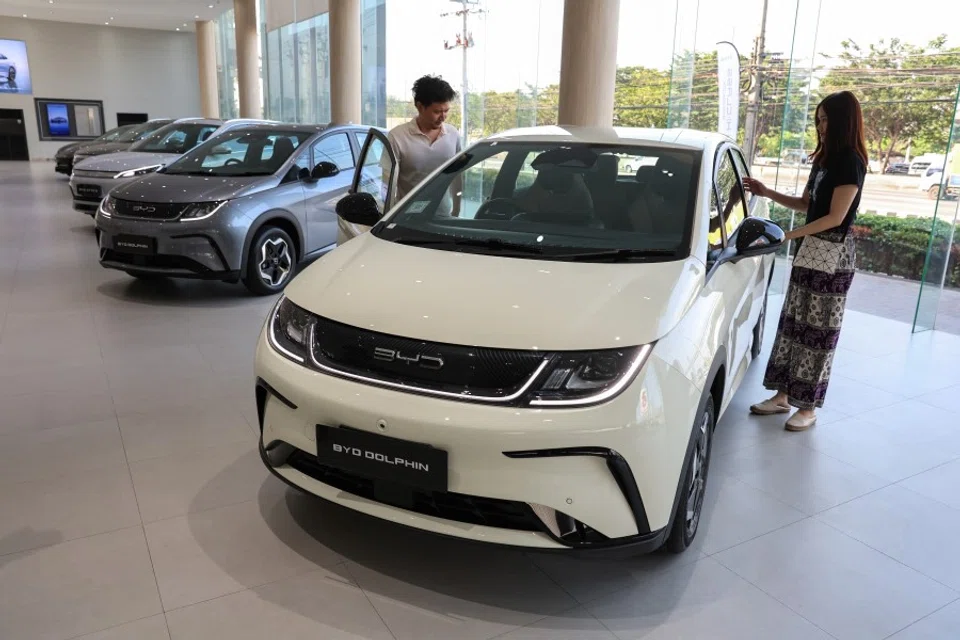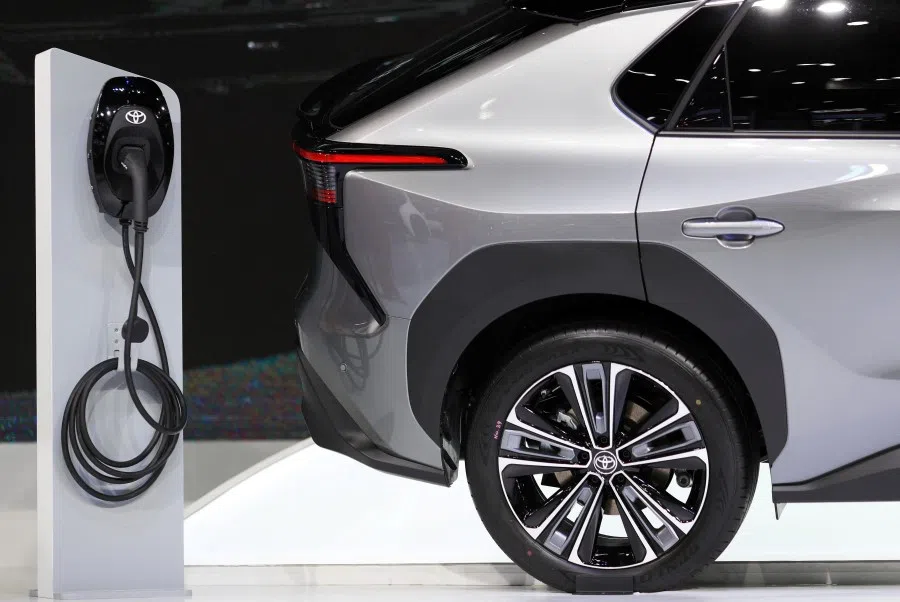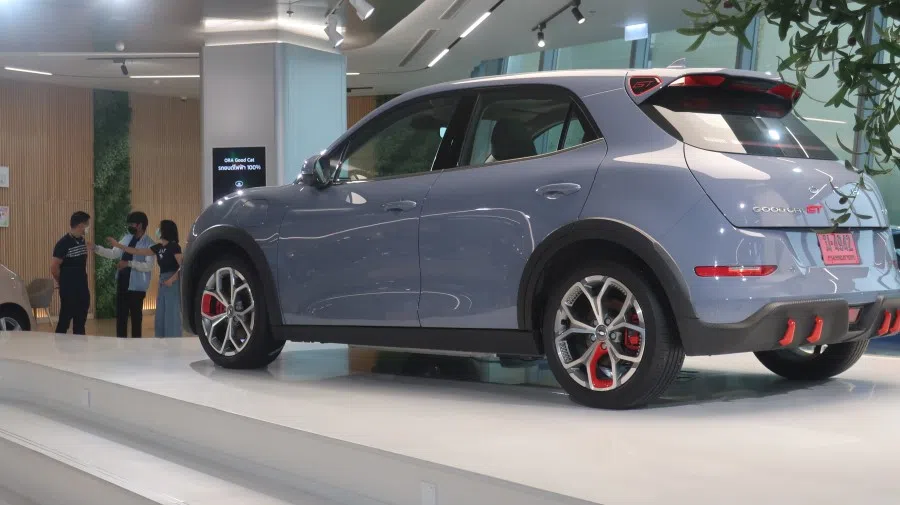'Made in Thailand' Chinese EVs could fill the auto market
Japanese academic Sukegawa Seiya notes that with the ASEAN-China Free Trade Agreement and the Thai government's aggressive promotion policies, the Thai auto market and even the global auto market could soon be filled with China EV brands that are made in Thailand.

A seismic shift is taking place in the Thai auto market, long considered Japan's stronghold. In 2023, of the 780,000 units in the Thai car market, 87,000 were Chinese cars, accounting for a double-digit share of 11%.
The top three manufacturers of Chinese cars are BYD, MG (SAIC-CP), and NETA (Zhejiang Combined New Energy Automobile), among which only MG currently has a production base in Thailand. Battery electric vehicles (BEVs), benefiting from the ASEAN-China Free Trade Agreement (ACFTA), are increasingly entering the Thai market, signalling a significant shift in automotive imports.
Increasing BEV imports and popularity
The surge in Chinese car sales in Thailand, apart from the ACFTA, can largely be attributed to the Thai government's aggressive BEV promotion policies. The Thai government has actively encouraged investment by promising economic incentives such as subsidies and excise tax reductions for imported BEVs, provided that these businesses commit to commencing BEV assembly in Thailand by 2024 or 2025.
Consequently, many Chinese companies have responded, and since 2022, Chinese-made BEVs have been flowing into the Thai market ahead of the establishment of production bases.
As a result, BEV sales will reach 74,000 units in 2023, and their share of the Thai automobile market will rapidly increase from 1.2% in the previous year to 9.5%. BEV production was only 164 units in 2023, and BEV imports are increasing rapidly.

In marketing, critical mass theory says that the threshold for an explosive jump in a product's popularity is 16% market share, but BEVs are at 9.5%, which is below that level. However, this does not reflect the fact that almost all BEVs are passenger cars, as there are still many challenges to BEV adoption in commercial vehicles.
Recalculating the BEV share in the passenger car segment, it reaches 25.2%, well above the theoretical threshold. Furthermore, the share for all next-generation vehicles, including BEVs, hybrid electric vehicles (HEVs), and plug-in hybrid electric vehicles (PHEVs), is 57.6%. A seismic shift is taking place in Thailand's passenger car market.
China's BEV market, dominated by state-owned and private companies of various sizes, has entered a "phasing out" era as excessive competition has led to low capacity utilisation. For these companies, a small gap in the Thai market is a "ray of light" for their survival.
Why Chinese auto manufacturers choose Thailand as their production base
With the exception of Tesla, companies introducing Chinese-made BEVs to the Thai market will receive BEV subsidies from the Thai government. These companies are incentivised to start BEV production in Thailand by 2024 or 2025, in line with the Thai government's strategic incentives.
BEV production in Thailand is in its infancy, with Mercedes-Benz starting production in mid-2023 and Honda and MG starting production in late 2023. In January 2024, Great Wall Motor began production of the "ORA", while BYD, NETA and Guangqi Autonomous New Energy (AION) will start local production in 2024, and Changan Automobile will start local production in 2025. In addition to supplying Thailand domestically, many of these companies are also considering exporting to the ASEAN region, Australia, New Zealand and Europe.
Originally, ASEAN countries imposed high tariff barriers in order to develop their own automotive industries. In the case of Thailand, a high tariff of 80% is imposed on a most-favoured-nation basis. However, as part of the regional economic integration efforts, the ASEAN Free Trade Area (AFTA) was established, which led to the elimination of tariffs exclusively for products originating within ASEAN, creating a new dynamic in regional trade.
As a result, there was a functional reorganisation of regional bases. A structure has been created in which Thailand and Indonesia have developed into automotive production and export bases in the region, while other countries support the ASEAN automotive industry by providing knock-down (KD) production and supplying key parts.
Even as FTAs with other countries in the region progressed in the 2000s, tariff barriers were basically maintained, except for countries with weak automotive industrial bases. In other words, the elimination of tariffs on automobiles was almost exclusively a privilege of ASEAN member countries. However, ASEAN's first ACFTA with an extra-regional country i.e., China, left a hole in Thailand's BEV tariff barriers, and BEV tariffs have been zero since 2010.
"Made in China" BEVs, which are a concern especially in Europe, can now be changed to "Made in Thailand".

China's BEV market, dominated by state-owned and private companies of various sizes, has entered a "phasing out" era as excessive competition has led to low capacity utilisation. For these companies, a small gap in the Thai market is a "ray of light" for their survival.
Furthermore, if local production is supported by the Thai government's BEV promotion policy, it will be possible to actively utilise the FTA networks established by Thailand and ASEAN. In addition, "Made in China" BEVs, which are a concern especially in Europe, can now be changed to "Made in Thailand".
If a Chinese car meets the 40% local content requirement and is certified as originating from Thailand, it will be exported within and outside the ASEAN region through the ASEAN FTA network.
Possibility of acquiring the highly anticipated title of "Thailand origin"
For Chinese EV companies to extend their exports beyond the Thai domestic market, leveraging FTAs is crucial, which necessitates meeting a "40% local content" requirement. This is likely to depend on the degree of localisation of battery production, which is estimated to account for one-third of a vehicle's price, and the extent to which Thailand's industrial clusters are utilised. However, in the early stages of production, most of the parts will be imported from China, and it will be difficult to meet these requirements.
If the "40% local content" requirement cannot be met, the majority of BEVs produced in Thailand will remain in the domestic market. If there is an oversupply, the entire market will be affected if discount sales become rampant, similar to what happened in China.
If a Chinese car meets the 40% local content requirement and is certified as originating from Thailand, it will be exported within and outside the ASEAN region through the ASEAN FTA network. This will lead to direct competition between automobile companies in destination countries and Chinese cars originating in Thailand. In any case, the Asian automotive industry is undergoing a major transition.



![[Big read] When the Arctic opens, what happens to Singapore?](https://cassette.sphdigital.com.sg/image/thinkchina/da65edebca34645c711c55e83e9877109b3c53847ebb1305573974651df1d13a)
![[Video] George Yeo: America’s deep pain — and why China won’t colonise](https://cassette.sphdigital.com.sg/image/thinkchina/15083e45d96c12390bdea6af2daf19fd9fcd875aa44a0f92796f34e3dad561cc)
